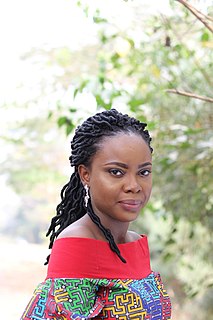A Quote by Chris Abani
My books are often shelved around those of Chinua Achebe and Margaret Atwood, or Chimamanda Adichie and Monica Ali. All of this depends, of course, on the bookstore and how conversant the shelf stocker is with the alphabet.
Related Quotes
Whether as living humans or as mythological figures, ancestors have always played an important role in the African popular and literary imagination. Sometimes, as in Amos Tutuola's famous short novels, they directly influence events. More often, as in the works of Chinua Achebe, both living and dead ancestors are sages offering valuable advice.
How does the saying go? When two locusts fight, it is always the crow that feasts.' Is that a Luo expression?' I asked. Sayid's face broke into a bashful smile. We have a similar expression in Luo,' he said, 'but actually I must admit that I read this particular expression in a book by Chinua Achebe. The Nigerian writer. I like his books very much. He speaks the truth about Africa's predicament. the Nigerian, the Kenya - it is the same. We share more than divides us.
Writing is a bit like walking into a big bookstore. It's the bookstore of your brain, and you know you're never going to read all those books. It makes you happy you're in the bookstore, and you're nervous because you know you're never going to read all those books. So the nervousness is also happy. Once I get going writing poetry is one of the happiest things I do, but it is also fraught with all of these anxieties.
The reason some crime writers have a chip on their shoulder about the label is because their good books are shelved beside books about nuns and birdwatchers and cats who solve crimes. Overseas, my books are reviewed alongside those of authors like Robert Stone and Don DeLillo, and I have to live and die by that comparison. They don't ghettoize crime writers in other countries, and of course they shouldn't.
I grew up in a world where authority was female. I never thought to call myself a feminist because of branding. I had this skewed idea of feminist: I thought it meant being a woman who hates men. When I read Chimamanda Ngozi Adichie's We Should All Be Feminists, I was like, "Oh, this is what my mom taught me. This is simple. I don't understand why everybody is not this."
I don't know Beyoncé, but I have the impression that she's sincere, that she really is a feminist and wanted to put the word out there to make it a good word in a big way by putting it in big letters on the stage, and especially because she was quoting the African novelist Chimamanda Ngozi Adichie who said, "We should all be feminists." She's a very accomplished and important novelist.
Books can be possessive, can't they? You're walking around in a bookstore and a certain one will jump out at you, like it had moved there on its own, just to get your attention. Sometimes what's inside will change your life, but sometimes you don't even have to read it. Sometimes it's a comfort just to have a book around. Many of these books haven't even had their spines cracked. 'Why do you buy books you don't even read?' our daughter asks us. That's like asking someone who lives alone why they bought a cat. For company, of course.


































